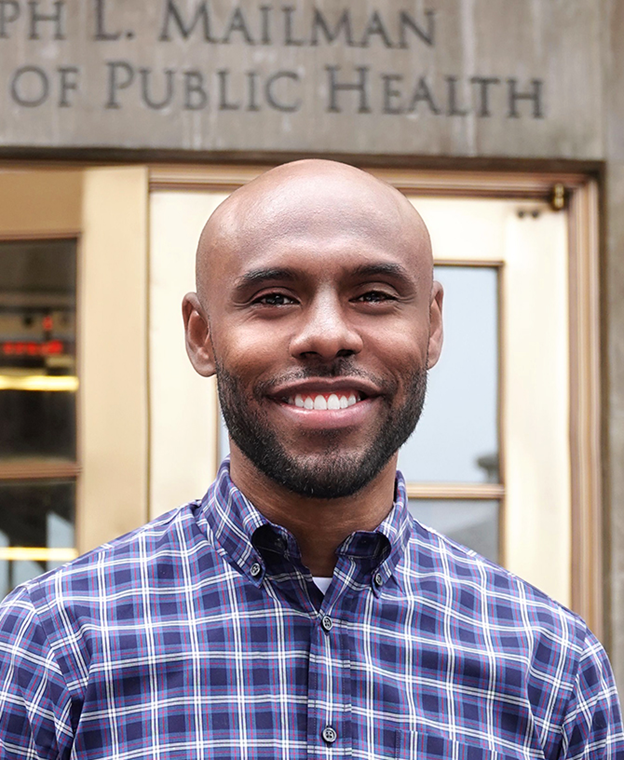Dustin T. Duncan
About Dr. Duncan
Dustin T. Duncan, ScD, is Associate Dean for Health Equity Research and Associate Professor of Epidemiology at Columbia University Mailman School of Public Health. He is an internationally recognized Social and Spatial Epidemiologist.
Dr. Duncan is also founder and president of the Dustin Duncan Research Foundation, dedicated to bold social justice and health equity research with and for marginalized populations and communities, who are often traumatized and oppressed. He is the brand-builder of Harlem University, a movement focused on educating Black boys and men from across the African diaspora, with future campuses in Harlem, New York, and Nairobi, Kenya. He has also developed the model for the Columbia East Africa Centre for Sexual and Gender Minority Health Equity Research, a community-based center focused on health equity research among sexual and gender minorities in East Africa, with its hub in Nairobi.
Prior to joining the Columbia faculty, Dr. Duncan was based at the Dana–Farber Cancer Institute Center for Community-Based Research, investigating how public perception of safety influenced people’s likelihood to walk in urban neighborhoods and how environmental influences cause obesity in young people, at the Harvard T.H. Chan School of Public Health. He was appointed the Alonzo Smythe Yerby Postdoctoral Fellow at Harvard.
Thought Leader & Innovative Researcher
Dr. Duncan is a sought-after global thought leader and innovative researcher. His pioneering research broadly seeks to understand how social and contextual factors influence population health. Dr. Duncan’s intersectional and health equity-based research focuses on gay, bisexual, and other sexually minoritized men and transgender people of color across the African diaspora including in the U.S., Caribbean, and Africa.
His work appears in leading public health, epidemiology, medical, geography, criminology, demography, and psychology journals. Working in collaboration with scholars across the world, he has written more than 200 high-impact scholarly articles and three books. His research has appeared in major media outlets, including U.S. News & World Report, The Washington Post, The New York Times, and CNN. His recent work is funded by the National Institutes of Health, the Centers for Disease Control and Prevention, the HIV Prevention Trials Network, the Robert Wood Johnson Foundation, the Verizon Foundation, and the Aetna Foundation.

Award-Winning Leader & Philanthropist
Dr. Duncan is an award-winning leader who has received several scientific contribution, mentoring, and leadership awards, including from the National Academy of Medicine (NAM), the Harvard University T.H. Chan School of Public Health (HSPH), and the Interdisciplinary Association for Population Health Science (IAPHS). In 2020, he proudly received the Mentor of the Year Award from Columbia University Irving Medical Center’s Irving Institute for Clinical and Translational Research.
Dr. Duncan currently serves on the Council for Black Health. At Columbia, Dr. Duncan directs Columbia’s Spatial Epidemiology Lab as well as co-directs the epidemiology department’s Social and Spatial Epidemiology Unit and co-directs the Health Equity Core in the HIV Center for Clinical and Behavioral Studies.
What reviewers are saying about the research and editorial works of Dr. Duncan
"The COVID-19 pandemic showed, yet again, that the consequences of pandemics emerge from far more than the pathogen itself. They emerge from the social conditions that set the stage for who becomes sick, who lives, and who dies. This book offers a comprehensive account of the social forces that created the COVID-19 pandemic and points to lessons we would be wise to learn if we are to mitigate the next pandemic."
~ Sandro Galea, MD, DrPH, Dean and Robert A. Knox Professor, School of Public Health, Boston University
"The methodological insights and specific research findings displayed here signal an important advance in epidemiology. This book summarizes much of the recent progress that has been made in studies that use aggregate or area-wide measurements. Overall, this book has much to offer. The authors themselves are clearly aware of the complexities, unsolved problems, and numerous challenges that confront anyone who wants to assess quantitatively the impact of social and geographic units on health." --American Journal of Epidemiology "Advances the debate over the theory and methodology of the study of neighborhoods and health to the center stage of epidemiology, public health, and health policy."
~ JAMA
"The distribution and control of disease in human populations has always been profoundly and inextricably social. As these authors skillfully and exhaustively demonstrate, the COVID-19 pandemic serves as a paradigmatic case study of the social determinants of exposure, infection, and disease. Race, gender, class, and power all play starring roles in this terrible saga, along with work, housing, policing and trust. This book provides a comprehensive account of how to understand mass disease in terms of a society out of joint."
~ Jay S. Kaufman, PhD, Professor, School of Population and Global Health, McGill University
